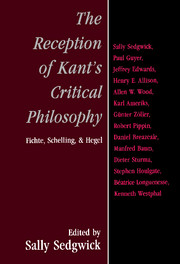Book contents
- Frontmatter
- Contents
- Notes on the Contributors
- Acknowledgments
- Introduction: Idealism from Kant to Hegel
- 1 The Unity of Nature and Freedom: Kant's Conception of the System of Philosophy
- 2 Spinozism, Freedom, and Transcendental Dynamics in Kant's Final System of Transcendental Idealism
- 3 Is the Critique of Judgment “Post-Critical”?
- 4 The “I” as Principle of Practical Philosophy
- 5 The Practical Foundation of Philosophy in Kant, Fichte, and After
- 6 From Critique to Metacritique: Fichte's Transformation of Kant's Transcendental Idealism
- 7 Fichte's Alleged Subjective, Psychological, One-Sided Idealism
- 8 The Spirit of the Wissenschaftslehre
- 9 The Beginnings of Schelling's Philosophy of Nature
- 10 The Nature of Subjectivity: The Critical and Systematic Function of Schelling's Philosophy of Nature
- 11 Substance, Causality, and the Question of Method in Hegel's Science of Logic
- 12 Point of View of Man or Knowledge of God: Kant and Hegel on Concept, Judgment, and Reason
- 13 Kant, Hegel, and the Fate of “the” Intuitive Intellect
- 14 Metaphysics and Morality in Kant and Hegel
- Bibliography
- Index
2 - Spinozism, Freedom, and Transcendental Dynamics in Kant's Final System of Transcendental Idealism
Published online by Cambridge University Press: 03 December 2009
- Frontmatter
- Contents
- Notes on the Contributors
- Acknowledgments
- Introduction: Idealism from Kant to Hegel
- 1 The Unity of Nature and Freedom: Kant's Conception of the System of Philosophy
- 2 Spinozism, Freedom, and Transcendental Dynamics in Kant's Final System of Transcendental Idealism
- 3 Is the Critique of Judgment “Post-Critical”?
- 4 The “I” as Principle of Practical Philosophy
- 5 The Practical Foundation of Philosophy in Kant, Fichte, and After
- 6 From Critique to Metacritique: Fichte's Transformation of Kant's Transcendental Idealism
- 7 Fichte's Alleged Subjective, Psychological, One-Sided Idealism
- 8 The Spirit of the Wissenschaftslehre
- 9 The Beginnings of Schelling's Philosophy of Nature
- 10 The Nature of Subjectivity: The Critical and Systematic Function of Schelling's Philosophy of Nature
- 11 Substance, Causality, and the Question of Method in Hegel's Science of Logic
- 12 Point of View of Man or Knowledge of God: Kant and Hegel on Concept, Judgment, and Reason
- 13 Kant, Hegel, and the Fate of “the” Intuitive Intellect
- 14 Metaphysics and Morality in Kant and Hegel
- Bibliography
- Index
Summary
In the final fascicles of the Opus postumum, Kant intends to work out a plan for a comprehensive system of transcendental idealism. It is a system that includes the cardinal principles of both our experience of sensible nature and our experience of freedom. One of the most intriguing aspects of Kant's thinking regarding this system is his increasingly affirmative view of Spinoza and Spinozism. Kant repeatedly attributes to Spinoza the idea that we “intuit everything in God.” He treats this idea as something that either itself furnishes, or else is necessarily connected with, a formal principle of unity. This Spinozistic principle is what governs the investigation of the formal determinacy of cognition (das Formale der Erkenntnis), and Kant clearly weighs the option of making it a, if not the, founding principle of his transcendental theory. Moreover, he explores the possibility of making Spinoza a representative of transcendental idealism and even goes so far as to identify this idealism as a form of Spinozism. These passages from Fascicle VII and Fascicle I give a fair sense of this line of reflection:
Spinoza: that we intuit everything in God and, indeed, according to the formal principle of unity.
(22:61.2–3)Transcendental idealism is the Spinozism of positing the object in the total complex [in dem Inbegriff] of its own representations.
Of Spinoza's idea of intuiting all objects in God. That means as much as comprehending all concepts constituting the formal determinacy of cognition, i.e., the elementary concepts, under one principle.
(22:64.6–11)The transcendental idealism of that of which our understanding is itself the author. Spinoza. – To intuit everything in God.
(21:15.6–7)- Type
- Chapter
- Information
- The Reception of Kant's Critical PhilosophyFichte, Schelling, and Hegel, pp. 54 - 77Publisher: Cambridge University PressPrint publication year: 2000
- 3
- Cited by



